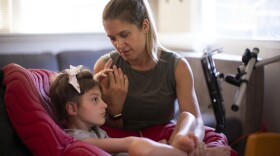
Emily Harris
International Correspondent Emily Harris is based in Jerusalem as part of NPR's Mideast team. Her post covers news related to Israel, the West Bank and Gaza Strip. She began this role in March of 2013.
Over her career, Harris has served in multiple roles within public media. She first joined NPR in 2000, as a general assignment reporter. A prolific reporter often filing two stories a day, Harris covered major stories including 9/11 and its aftermath, including the impact on the airline industry; and the anthrax attacks. She also covered how policies set in Washington are implemented across the country.
In 2002, Harris worked as a Special Correspondent on NOW with Bill Moyer, focusing on investigative storytelling. In 2003 Harris became NPR's Berlin Correspondent, covering Central and Eastern Europe. In that role, she reported regularly from Iraq, leading her to be a key member of the NPR team awarded a 2005 Peabody Award for coverage of the region.
Harris left NPR in December 2007 to become a host for a live daily program, Think Out Loud, on Oregon Public Broadcasting. Under her leadership Harris's team received three back to back Gracie Awards for Outstanding Talk Show, and a share in OPB's 2009 Peabody Award for the series "Hard Times." Harris's other awards include the RIAS Berlin Commission's first-place radio award in 2007 and second-place in 2006. She was a John S. Knight fellow at Stanford University in 2005-2006.
A seasoned reporter, she was asked to help train young journalist through NPR's "Next Generation" program. She also served as editorial director for Journalism Accelerator, a project to bring journalists together to share ideas and experiences; and was a writer-in-residence teaching radio writing to high school students.
One of the aspects of her work that most intrigues her is why people change their minds and what inspires them to do so.
Outside of work, Harris has drafted a screenplay about the Iraq war and for another project is collecting stories about the most difficult parts of parenting.
She has a B.A. in Russian Studies from Yale University.
-
In 2022, schools recouped $6.6 billion from federal and state Medicaid programs for student healthcare. They could be getting much more.
-
Fifty years ago, Title IX banned discrimination based on sex in educational institutions. College sports had to change. This is the story of how four women fought to make that happen.
-
On Friday, March 13, President Donald Trump and Vice President Mike Pence stood in the White House Rose Garden to declare COVID-19 a national emergency....
-
Correspondents, editors and producers from our newsroom share the pieces that have kept them reading, using the #NPRreads hashtag. Each weekend, we highlight some of the best stories.
-
The little girl did something lots of kids do. She took her clothes off. The teacher acted as if the child had ruined her life. The Gaza Strip mother found the courage to rebuke the teacher.
-
At the high-tech center where Israel's military keeps an eye on Hamas-controlled Gaza, soldiers monitor the border using remote-controlled cameras and machine guns.
-
A dozen photographers were set loose with the aim of seeing an old conflict in a new light. The result is a photo exhibit now showing in Tel Aviv and coming soon to the U.S.
-
Mazel tov, it's a global baby boy! The egg was from a South African donor; the sperm was from Israel. The surrogate mom lived in Nepal. And when the dads came to meet their son, an earthquake struck.
-
In the 1990s, Israelis and Palestinians made temporary arrangements in the West Bank as they worked toward a peace deal. The talks are now in the deep freeze, but the arrangements are entrenched.
-
The two leading Palestinian factions recently agreed to end a feud and work together. But in the Gaza Strip, the wounds have not healed from a nasty bout of infighting in 2007.










